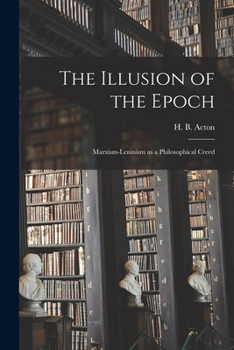The Illusion of the Epoch: Marxism-Leninism as a Philosophical Creed
Select Format
Select Condition 
Book Overview
The Illusion of the Epoch helps readers to understand the roots of Marxism-Leninism and its implications for philosophy, modern political thought, economics, and history. As Professor Tim Fuller has... This description may be from another edition of this product.
Format:Paperback
Language:English
ISBN:1014753694
ISBN13:9781014753694
Release Date:September 2021
Publisher:Hassell Street Press
Length:296 Pages
Weight:0.92 lbs.
Dimensions:0.6" x 6.1" x 9.2"
Customer Reviews
1 rating
A devastating critique of Marxist thought
Published by Thriftbooks.com User , 14 years ago
This is a serious and useful study of the metaphysics of Marxism. Harry Burrows Acton points out that for the most part Marxism is regarded as "a body of economic and social doctrine" and has therefore been chiefly "dealt with by economists, social theorists or historians." But Marxists themselves regard their beliefs about "the most general and significant factors of the universe" as giving "depth and significance" to their economic and social theories. Hence, Acton holds it desirable to examine Marxist metaphysics "on its merits, with a view to its consistency and suggestiveness" (pp. 1-3). The main metaphysical concepts involved are the following: realism, naturalism, and dialectic. Concerning realism (the belief that "material things exist independently of perception of, or thought about, them"), Acton maintains that the Marxists are correct in rejecting both idealism and phenomenalism (p. 35), but he regards the arguments by which they reach this conclusion as either superficial or irrelevant (pp. 21-29). As regards naturalism (the belief that "matter existed before minds existed, and that minds have developed out of matter"), Acton is chiefly concerned with two corollaries: the Marxists' denial of speculative philosophy and their belief that "scientific methods are supreme" (p. 53). On these points Acton holds not only that the Marxists' arguments are weak--as with their refutation of idealism and phenomenalism--but also that their conclusions are mistaken. The "empiricist-positivist point of view" has not rid itself of metaphysics; it has merely uncritically assumed a metaphysics of its own. Further, there is a place for speculative thought: "philosophy must be thinking in its most self-conscious form, and such thinking must necessarily be very different from the thinking that is directly immersed in particular enquiries" (pp. 59-60). Regarding the dialectic (the belief that things are "organically interconnected, dynamic, sudden, and contradictory") Acton shows that the Marxists are badly confused. For instance, they never really settle on any one meaning of "novelty" (pp. 89-93). Again, they formulate a number of "laws of dialectic" (for example, the Law of the Transformation of Quantity into Quality and the Law of the Negation of the Negation), but these are "etiquette rather than science....The conquest of a people's language becomes a conquest of their thought as etiquette develops into custom and custom into morals" (p. 101). From such strictly metaphysical concepts Acton next turns to the philosophy of history and Marxist ethical theory. Acton again here is devastating. On the last page of his book Acton sums up in a single phrase: "Marxism is a philosophical farrago." This valid opinion is announced because Marx takes the dialectic of Hegel minus its Idealism and the "positivist" brand of empiricism of Comte sans all the idiosyncrasies appended to it, and forming what is a philosophy of bifurcation and inconsistency.





